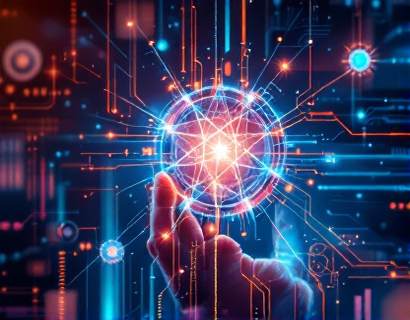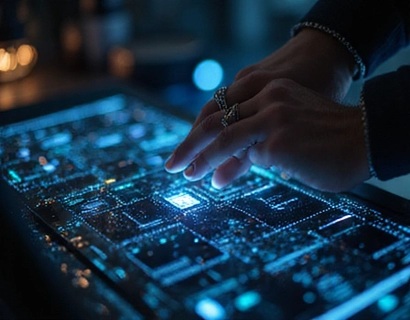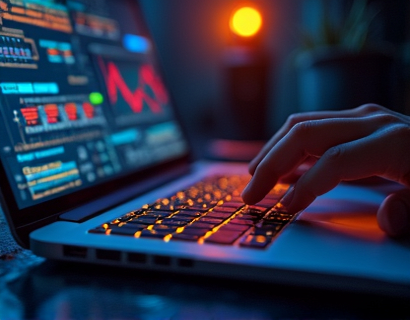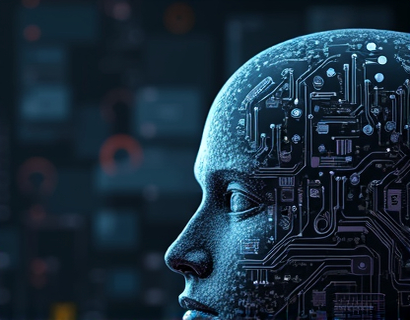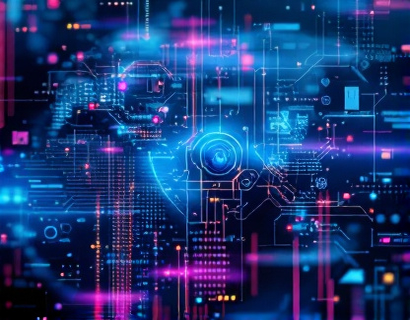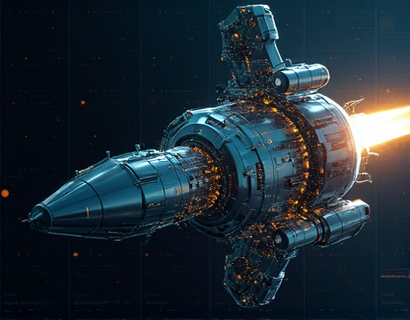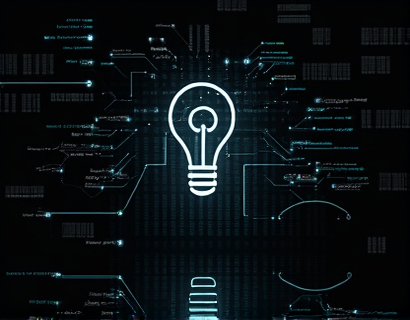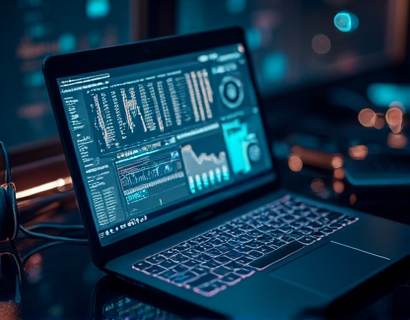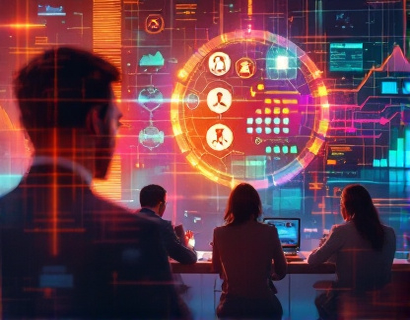AI and Crypto Synergy: Transforming Digital Ecosystems for Innovators
The intersection of Artificial Intelligence (AI) and cryptocurrency is creating a revolutionary landscape that is redefining digital ecosystems. This synergy is not just a trend but a transformative force that is empowering innovators with advanced tech solutions. The fusion of AI and cryptocurrency is unlocking new possibilities, enhancing security, efficiency, and user experience in the digital realm. This article delves into the advanced technologies and innovative strategies that are reshaping the crypto landscape, offering tech-savvy innovators cutting-edge tools to elevate their digital experiences and explore the future of connectivity.
The integration of AI in the crypto space is multifaceted, impacting various aspects from blockchain optimization to decentralized finance (DeFi) and beyond. AI algorithms are being employed to analyze vast amounts of data, predict market trends, and automate trading processes. This not only increases the efficiency of crypto operations but also provides users with more accurate and timely insights. The ability of AI to process and interpret complex data sets is a game-changer, enabling more informed decision-making in the volatile crypto market.
Enhancing Security with AI
Security remains a paramount concern in the crypto world, and AI is playing a crucial role in fortifying defenses against cyber threats. Machine learning models can detect anomalies and patterns indicative of fraudulent activities, such as phishing attacks or unauthorized transactions. These AI-driven security systems are capable of learning from past incidents, adapting to new threats, and providing real-time alerts to users. This proactive approach to security is essential in a domain where the stakes are high and the risk of breaches is ever-present.
Moreover, AI can enhance the security of smart contracts, which are self-executing contracts with the terms directly written into code. AI tools can analyze smart contract code for vulnerabilities, ensuring that they are free from bugs and potential exploits. This level of scrutiny is crucial for maintaining the integrity of decentralized applications (dApps) and ensuring that users can transact with confidence.
Optimizing Blockchain Performance
Blockchain technology, while revolutionary, faces challenges related to scalability and transaction speed. AI is helping to address these issues by optimizing blockchain protocols and improving network efficiency. For instance, AI can be used to manage consensus mechanisms more effectively, reducing the computational load and energy consumption associated with mining. This not only makes blockchain more sustainable but also more accessible to a broader range of users.
Another area where AI is making a significant impact is in the development of sharding techniques. Sharding involves dividing a blockchain into smaller, more manageable parts, each handling a subset of transactions. AI algorithms can optimize the sharding process, ensuring that data is distributed evenly and that the network operates at peak performance. This results in faster transaction times and lower fees, making blockchain more practical for everyday use.
Personalized User Experiences in DeFi
Decentralized finance (DeFi) is one of the most exciting frontiers in the crypto space, offering a range of financial services without traditional intermediaries. AI is enhancing the DeFi experience by providing personalized recommendations and tailored financial products. By analyzing user behavior and preferences, AI can suggest optimal investment strategies, loan options, and insurance products. This level of personalization not only improves user satisfaction but also increases the adoption of DeFi platforms.
Furthermore, AI-powered chatbots and virtual assistants are becoming increasingly common in DeFi applications. These AI-driven interfaces can guide users through complex financial processes, answer queries, and provide real-time support. The combination of AI and DeFi is creating a more user-friendly and accessible financial ecosystem, breaking down barriers to entry for newcomers.
AI in Crypto Asset Management
Asset management in the crypto space is evolving with the help of AI. Robo-advisors, powered by AI algorithms, are taking over the traditional role of human financial advisors. These AI-driven platforms use machine learning to analyze market data, assess risk, and create diversified investment portfolios. The algorithms continuously learn from market conditions, adjusting portfolios to maximize returns and minimize risk. This level of automation and precision is particularly valuable in the crypto market, where rapid changes can significantly impact asset values.
Additionally, AI can help in the valuation of crypto assets by analyzing a wide range of factors, including market sentiment, technological advancements, and regulatory changes. This comprehensive analysis provides a more accurate assessment of asset value, aiding investors in making informed decisions. The ability to quantify and predict the value of crypto assets is a significant step forward in the maturation of the crypto market.
Supply Chain Optimization with Blockchain and AI
The supply chain industry is another area where the synergy of AI and blockchain is making a substantial impact. By combining the transparency and immutability of blockchain with the analytical power of AI, companies can achieve unprecedented levels of efficiency and traceability. AI can optimize logistics by predicting demand, managing inventory, and streamlining transportation routes. Blockchain ensures that every step of the supply chain is recorded and verified, reducing the risk of fraud and errors.
For example, AI-driven analytics can identify bottlenecks in the supply chain, suggesting improvements and optimizations. Meanwhile, blockchain provides a tamper-proof record of transactions, enhancing trust among all parties involved. This synergy not only improves operational efficiency but also enhances consumer confidence in the products they purchase.
Enhancing Identity Verification
Identity verification is a critical component of the crypto ecosystem, ensuring that transactions are conducted by legitimate users. AI and blockchain are combining to create robust and secure identity verification systems. Self-sovereign identity (SSI) frameworks, powered by blockchain, allow individuals to control their personal data and verify their identity without relying on centralized authorities. AI algorithms can analyze and authenticate this data, ensuring its accuracy and integrity.
This approach not only enhances security but also empowers users by giving them more control over their personal information. The integration of AI and blockchain in identity verification is paving the way for a more secure and user-centric digital identity system, which is essential for the widespread adoption of crypto technologies.
Future Prospects and Challenges
The synergy between AI and crypto holds immense potential, but it also comes with challenges that need to be addressed. One of the primary concerns is the regulatory landscape, which is still evolving and often varies by region. Innovators must navigate these regulations carefully to ensure compliance while leveraging the benefits of AI and crypto. Additionally, the technical complexity of integrating these technologies requires a skilled workforce, which is currently in short supply.
Another challenge is the energy consumption associated with AI and blockchain, particularly proof-of-work (PoW) blockchains. The environmental impact of these technologies is a growing concern, and the industry is actively exploring more sustainable alternatives, such as proof-of-stake (PoS) and other consensus mechanisms. The development of greener technologies will be crucial for the long-term viability of AI and crypto synergy.
Conclusion
The fusion of AI and cryptocurrency is transforming digital ecosystems in profound ways, offering innovators a suite of advanced tools to enhance their digital experiences. From improving security and optimizing blockchain performance to personalizing DeFi experiences and optimizing supply chains, the potential applications are vast. As the technology continues to evolve, it is essential for innovators to stay informed and adapt to the changing landscape. The future of connectivity is being redefined by this powerful synergy, opening up new horizons for those willing to embrace the possibilities.








